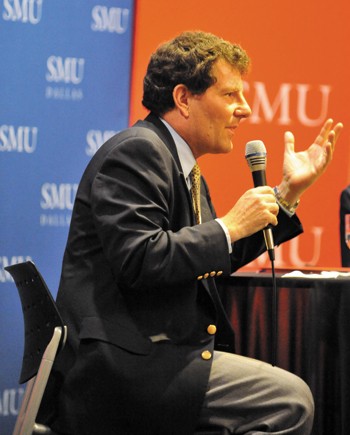
Nicholas Kristof answers questions at the Tate Student Forum in Hughes-Trigg Student center Tuesday afternoon. (Stuart Palley)
Nicholas Kristof, a two-time Pulitzer Prize-winning commentator and journalist with The New York Times, spoke to SMU students and the community in the McFarlin Auditorium for the Jones Day Lecture in the William M. Tate Lecture Series.
Kristof encouraged students to “travel out of your comfort zone.”
“Learn from your travels and apply them to a larger cause important to you,” he said.
Kristof speaks from much experience abroad and encourages others to travel and see with their own eyes what is happening at a grassroots level in the world at this very moment.
Kristof spoke about a new approach to international relations taking place, which he is very much a fan of. He gave the example of author Greg Mortenson, who wrote the bestseller “Three Cups of Tea,” as someone who is doing a good thing by taking the actions involved in international relations to a new and better level.
“This is because the intervention that one has with a completely different culture than their own is extremely educational and will give you the best lesson and education possible,” Kristof said.
Kristof also shared some stories and photographs that have particularly stuck in his mind over the years.
One story was from 1997 when he traveled to Cambodia and visited a brothel to interview two imprisoned teenage girls. These young girls were sold off to the brothel for a good price and would not be allowed to leave the brothel unless that price was matched.
One girl’s mother had gone on a strenuous journey looking for her daughter in different brothels, and when she finally found her, she did not have enough money to buy her back.
Kristof explained the conditions in the brothel as “worse than 19th century slavery.” Most of the girls contracted the AIDS virus from men who came to the brothels, and were not expected to live past their twenties. After hearing and seeing all of this with his own eyes, Kristof bought the two girls and returned them to their families.
Although he was able to reunite the girls with their families, Kristof made it clear that this was one happy ending that does not occur too often in Darfur, from where he just returned.
The amount of pain and suffering the Janjaweed has had on innocent people in Darfur, simply because of their skin color or tribe is, “indescribable” said Kristof. He recounted one experience in Darfur, when he spoke with a woman who saw her family killed by the Janjaweed in front of her eyes and then was brutally branded on her leg as a sign that she had been raped. This was Kristof’s turning point when he realized the extent of the brutality in Darfur.
Kristof ended his lecture by telling his audience, “People make us happy.”
“The act of helping and giving is what will raise your happiness level and keep it raised, not winning the lottery,” he said.
He encouraged, once again, for young people to travel to new worlds that they are deeply uncomfortable with and see something that will all of a sudden make them realize and really absorb how privileged they are.









